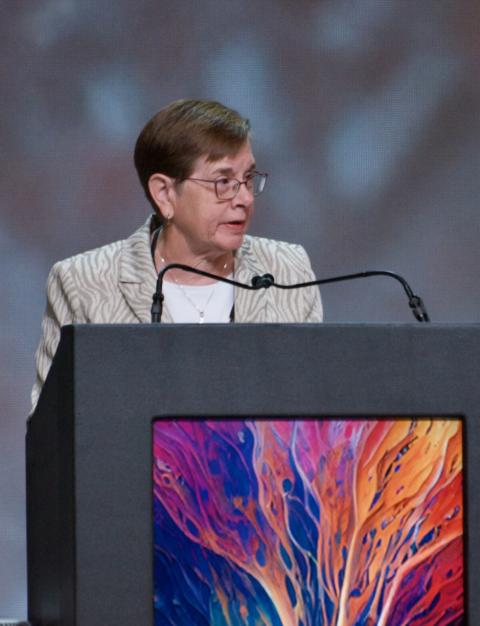
However religious life evolves, whatever new religious life emerges, consecrated women will continue to answer God’s call with a courageous “YES,” sisters heard Aug. 14.
Sr. Maureen Geary, president of the Leadership Conference of Women Religious and a Grand Rapids Dominican, told the more than 800 people gathered for LCWR’s annual assembly that what matters is the mission, whatever that mission may be. LCWR represents about two-thirds of the nearly 36,000 sisters in the United States.
Answering the question in the assembly’s theme, “Who then shall we be?” Geary cited the 1st Book of John: That while we are now children of God, what we will be is not known. But there are some things that will not change.
“It is the process that makes the Synod for Synodality a force for shaping who we shall be, as a church committed to mission, communion and participation,” Geary said. “By extension of our mission, we also shape society — thus, where we go shapes us into who we shall be.”
“We shall be women who answer the call to serve in this world in which we live — this world that has so much pain and so many needs,” she said. “We shall be nourishment for the life of the world.”
Grand Rapids Dominican Sister Maureen Geary, OP,
President of Leadership Conference for Women Religious
Living the religious life also means living the mission.
“What we shall do now is mission, what we shall later do is mission, as the road before us is revealed,” she said. “The mission of Jesus Christ, whoever we shall be,” said Geary.
LCWR leaders also acknowledged that Florida is where the Trail of Tears began, the forced migration of Native Americans who were driven from their ancestral lands to Oklahoma, and that it was once a bastion of slavery and the site of the Pulse Nightclub massacre, a 2016 hate crime targeting LGBTQ persons that killed 49 and wounded 53 others.
Orlando Bishop John Noonan noted that Florida was also the site of lesser known atrocities and sacrifice, such as the Florida Martyrs, and where the Sisters of St. Joseph were arrested and imprisoned in 1913 for teaching Black children in St. Augustine.
Keynote speaker Fr. Bryan Massingale added to the list, noting Florida has made it illegal to teach students “lessons that would make a student uncomfortable about their race,” forcibly bussed people seeking asylum to other states, has been at the forefront of efforts to dismantle efforts for diversity, equity and inclusion, and reversed policies promoting green energy, despite experts warning that climate-related sea level rise may have the lower third of the state underwater by the year 2100.
He said the point is not to dump on Florida, but that “the events, trends and tensions we see here are a mirror or microcosm of trends we see in the nation and our world.”
Massingale is a priest and professor specializing in social ethics, and has a passion for advancing a Black approach to Catholic theological ethics, focusing on the impact of religious faith as an instrument of social injustice and a catalyst for social transformation.
He cited Pope Francis saying we are not in an era of change, but in a change of eras, and that the rise of hatred and division stems from fear of that change.
“We are no longer a white, Christian nation, and many white Christians are fearful and angry,” Massingale said. The changes are “experienced as an existential threat that undermines one’s self-identity and the foundations upon which some believe the country was built.”
“We live in a time of unvoiced and ungrieved loss,” Massingale said, pointing out that religious life is also in a change of eras and that the losses the changes are creating must be named and lamented for new life to emerge. “Unvoiced loss becomes a source of anger, depression, lack of hospitality, and a perception of the new as threat, not gift.”
The key, he said, is that lament must become the prelude to action and change.
“Grieving and lamenting the loss of the present prepares us for the arrival of the new. Lamenting allows us to greet the arrival of the new as a gift, not a threat,” Massingale said. “Paradoxically, lament prepares the way for new beginnings.”
He said this requires women religious to let their grief of the world’s brokenness inspire action for a more just country: “to teach us, the church, and especially white North Americans, how to grieve the passing of a world that must end,” and to teach us to move gracefully into the new world; and to dream of the future to come and the legacy sisters will leave as their gift.
“Dare to dream. To dream boldly. To dream audaciously. To dream subversively,” Massingale said. “We don’t need less imaginative hope. We need more.” READ FULL ARTICLE https://www.globalsistersreport.org/news/news/lcwr-assembly-invites-sisters-become-catalyst-social-transformation

